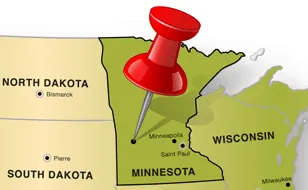 Minnesota DWI Laws
Minnesota DWI Laws
Minnesota has two sets of procedures that you must attend to when you have been charged with a DWI—administrative and judicial. We suggest that you consult with a DWI attorney immediately to make sure you get the best advice for your particular situation as laws are always changing.
Administrative License Revocation (ALR) Procedures
Minnesota Department of Public Safety
Minnesota is one of 42 states that has implemented ALR which means that your license will be confiscated immediately if your BAC is above .08 OR if you refuse a BAC test. Your license will either be suspended or revoked at that point, even though you have not been officially convicted in a criminal trial. In fact, you can be charged with an administrative license suspension even if you are not later charged with a driving under the influence offense. This action was designed to be in addition to and separate from the traditional DWI judicial conviction penalties such as license suspension, jail time, community service hours, ignition interlock device (IID), and alcohol and drug rehabilitation.
You will be given a 7 day grace period during which you can drive under a temporary driving permit issued by the officer at the scene. During that time, you can request a hearing to challenge this case. This case will be heard by an administrative law judge. If you do not request a hearing, your license will be automatically suspended on the 8th day for 90 days. After the suspension period, you will have a restricted license allowing you to drive to work or school, health care providers, parole or probation meetings, drug and alcohol counseling, court approved locations and emergencies. Minnesota allows you to install an interlock device in lieu of suspension time after 15 days.
Remember that this is a separate case than the judicial case, with separate authorities and separate rulings. This can be a very important influence upon the judicial procedures, but you must act very quickly if you wish to challenge this.
Judicial Procedures
In Minnesota, the drunk driving law prohibits a person from driving when they have a BAC of .08% or higher. Courts are required to order the installation and monitoring of an interlock device for any driver whose BAC levels are .08% or higher if their BAC was .15 or higher.
License Revocation, Fines and Jail
First Offense – Misdemeanor
Administrative Sanctions
- Under 0.16: 15 days of no driving privileges and 75 days of limited license. Full driving privileges available with ignition interlock for 90 day revocation period.
- Under 0.16 with child in vehicle: 15 days of no driving privileges and 75 days of limited license. Full driving privileges available with ignition interlock for 90 day revocation period.
- 0.16 and over and/or child in vehicle: 1 year of no driving privileges or 1 year of an ignition interlock with a restricted driver’s license. License plates impounded. Vehicle forfeited.
Criminal Penalties
- Under 0.20: Misdemeanor. 90 days in jail; up to $1,000 in fines.
- Under 0.20 and child in vehicle: Gross Misdemeanor. Up to 1 year in jail; up to $3,000 in fines.
- 0.20 or over: Gross Misdemeanor. Up to year in jail; up to $3,000 in fines.
- 0.20 or over and child in vehicle: Gross Misdemeanor. Up to 1 year in Jail; up to $3,000 in fines.
Second Offense – Gross Misdemeanor
Administrative Sanctions
- Under 0.16: 1 year of no driving privileges or 1 year of an ignition interlock on a restricted driver’s license. License plates impounded.
- Over 0.16: 2 years of no driving privileges or 2 years of an ignition interlock on a restricted driver’s license. License plates impounded.
- Child in vehicle: Depends on alcohol-concentration level—see above.
Criminal Penalties
- Under 0.20: Misdemeanor. 90 days in jail; up to $1,000 in fines.
- 0.20 or over: Gross Misdemeanor. Up to year in jail; up to $3,000 in fines.
- Child in vehicle: Gross Misdemeanor. Up to 1 year in Jail; up to $3,000 in fines.
Third Offense – Gross Misdemeanor
Administrative Sanctions
- Any alcohol level: License cancelled as “inimical to public safety.” 3 years of no detected use of alcohol and/or drugs or removal of the ignition interlock device (1 year of limited license with an ignition interlock restriction upon enrollment in treatment. 2 years of an ignition interlock restricted driver’s license upon completion of treatment.) License plates impounded.
Criminal Penalties
- Any alcohol level: Gross Misdemeanor. 1 year in jail; up to $3,000 in fines.
Fourth or More Offense – Felony
Administrative Sanctions
- Any alcohol level: License cancelled as “inimical to public safety.” 4-6 years of no detected use of alcohol and/or drugs or removal of the ignition interlock device (1 year of limited license with an ignition interlock restriction upon enrollment in treatment. 3-5 years of an ignition interlock restricted driver’s license upon completion of treatment.) License plates impounded.
Criminal Penalties
- Any alcohol level: Felony. 7 years in jail; up to $14,000 in fines.